explore how care manifests in our actions for others, for ourselves, for nature, and for the cities we call home.
Each time our editorial team gathers to publish an issue of SPROUT, we reflect on the role of poetry to comment on the current state of the eco-urban. When we read through the submissions, we feel that our original vision and mandate for the journal is confirmed by the special kind of sustained attention—a specific way of looking—that poetry engenders. Poetry slows the reader down; and, in calling them to still their body and mind—in space—this stillness enables them to look afresh and anew. To slow down, to look again, is a form of care. After all, the act of “paying careful attention” features as one of the denotative meanings of care and certainly revealed itself as a concern within the works submitted to CARE, the theme of our fourth issue. Attunement requires care: to write about anything, demands that we care (in some sense or another) about it. Care is both verb and noun: an act and a thing that is created through action. For instance, a care-home is a thing, but also exists through many acts, and through continued, collective action. Care, then, is how we carry out and show concern, how we extend support to others, and how we work towards more inclusive and equitable spaces. Care is an expression of embodied love for the human, the natural, the urban.
The poems assembled here play with different methodologies of care and explore how care manifests in our actions for others, for ourselves, for nature, and for the cities we call home. Care is indeed an interesting word: to be full of care does not mean the same thing as its tentative linguistic transposition: careful. Moreover, care does not always present positively; if we take its antonym, “carelessness” or a “lack of care”, we see poems that explore acts that are harsh, unkind, or indifferent to the lives of others. Inequities in the economy of care reflect in our societies through structural, environmental, and climate injustices. And this is where the issue takes flight—in this dyadic realm of care—with doves caring for their young (for our readers unacquainted with pigeon knowledge, they feed their babies crop milk) in a city they have come to mourn. We gain our footing in the issue through a poem that suggests care in the urban space is something carried out by its non-human denizens in the face of its imminent collapse. The liturgic quality of Lea Marshall’s “Future Folk Tales: Doves” carries a warning that our current urban practices are not sustainable. Taking care of something then takes on a more ominous meaning in Erica Bartholomae’s poem, “He took care of it, for them”, where a snake is killed in front of a crowd of onlookers. The poem shows how care can be a double-edged sword: by protecting one group (exercising care), another entity is harmed (the snake). Its “triangular head” (a South African Puff Adder, perhaps?) hints at its venomousness, but the threat it presents is undone by the fact that it takes twelve people to ensure its “head was smashed in”. Taking care can be selective and should not be confused with giving care.
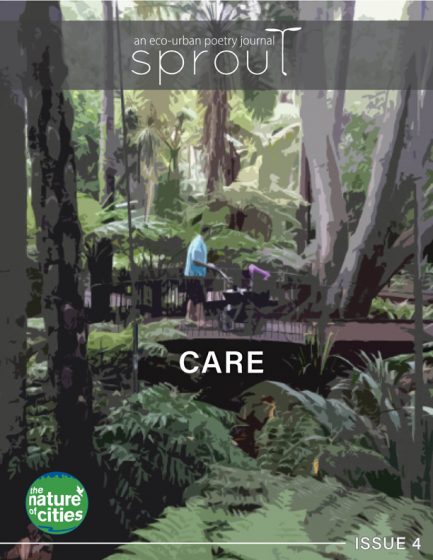 The tone of the issue soon shifts as we segue into an offering from another South African-based poem: Elizabeth Trew’s “Kramat”. Set in Cape Town, we’re offered a more balanced sense of care, where the eco-urban exists in harmony with each other, with “Wildflowers and stones” (along with five holy sites)—on the neighbouring mountain, Lion’s Head—“encircling, protecting the mother city”. There is gentle consonance between the gardener tending beds of “day-lilies and African iris” amidst the “purple gorse and a kestrel in flight”. However, the present sense of peace that surrounds this holy site should not obscure its history: this place commemorates those “who gave their faith to slaves at the Cape”. This line subtly, but powerfully resurrects the history of slavery in the Cape Colony—a period and system that signified the total abnegation of care towards those rendered subaltern. We are called to remember that care might be abundant in this scene now, yet a harsher time came before.
The tone of the issue soon shifts as we segue into an offering from another South African-based poem: Elizabeth Trew’s “Kramat”. Set in Cape Town, we’re offered a more balanced sense of care, where the eco-urban exists in harmony with each other, with “Wildflowers and stones” (along with five holy sites)—on the neighbouring mountain, Lion’s Head—“encircling, protecting the mother city”. There is gentle consonance between the gardener tending beds of “day-lilies and African iris” amidst the “purple gorse and a kestrel in flight”. However, the present sense of peace that surrounds this holy site should not obscure its history: this place commemorates those “who gave their faith to slaves at the Cape”. This line subtly, but powerfully resurrects the history of slavery in the Cape Colony—a period and system that signified the total abnegation of care towards those rendered subaltern. We are called to remember that care might be abundant in this scene now, yet a harsher time came before.
In Jessica Foley’s contributions to CARE—“Sleepwalking (Fairview Park, 8th November)” and “An Baile Bocht” (Irish for “poor town”)—her poetic eye, sharp, zeroes in on Dublin, and her keen attention offers the reader insight on a city “at tension” with and in itself. In “Sleepwalking”, Foley describes tents pitched along a boundary edge of a local park. Tents could easily been viewed as a symbol of multiple crises converging—housing, homelessness, migration (to be clear: the crisis here is not migration, but rather, the xenophobia and racism that has been given space to grow by those who know exactly how to tend and exploit fear and suspicion of “the other”)—and while it would have been easy (too easy) to follow this thread all the way down to the November 2023 Dublin riots, Foley instead, gives us “gather, share, eat”; these are words that shed light on care (as a function of depth and volume), and deep caring in action. This poem also provides the opportunity to reflect on what it means to be a mother and the practice of motherhood in urban spaces—something that has been explored by previous SPROUT contributors, including Anna Rowntree’s “In the Shade of Some Newly Planted Thing” (see Issue 3: SHADE) and also picked up in Lindsay Campell’s meditation. Meanwhile, in “An Baile Bocht”, readers encounter love (both the word, and the emotion conveyed) for the first time in the issue: “I love the sound of traffic — / I love the sound of leaves”. Foley’s attention brings us back into dialectical tension with the city—to love Dublin, it is necessary (or is it?) to make space for both sounds (of leaves, of traffic), to love both. To pursue this idea further, we invited Dick Gleeson, the former City Planner for Dublin, to meditate specifically on Jessica’s work for this issue.
In Thomas Ellison’s “Wellspring”, through simile, we experience a careful, delicate, and well-earned shift from one thing to another, and, just like that, the world is blown wide open (meaning: this is poetry, doing what poetry does): “the bird is like a door, / spilling light into a room, / preening its feathers, / noticing the bloom, / then transposing it there”. As this poem draws to a close, the connection between light and water is shown to us as “spilling liquid on the roots / splashing light on the leaves”. In both instances, these acts of spilling and splashing offer the reader new insight on care—neither haphazard nor wild, this is language that (at)tends. We close the issue with David Capp’s “Pledge in Late Summer”: set in summer, it ruminates on the image of trees being like two lovers holding hands, before shifting focus on to repeated attempts to break into the community garden shed (a collective symbol of care and caring); one can’t help but think of the lovers, again, as hinges, as a way to fully appreciate the significance and detrimental impact of the break-in for the community: taking what is harmoniously in unison but “prying…until / there are two pieces”.
From its inception, as a creative project of The Nature of Cities, SPROUT intended to be a space of convergence where transdisciplinary conversations about the eco-urban through poetry could take place. We are delighted to include in this issue meditations from Lindsay Campbell (Research Social Scientist, USDA Forest Service) who reflects on the reciprocal nature of care through the concept of stewardship; from Architect and Research Fellow, Tom Grey, who writes on care as a complex and contested thing; and lastly, from Dick Gleeson (former Dublin City Planner), who, as mentioned above, provides us with a focused meditation on the two Dublin-centric poems from contributor, Jessica Foley.
We thoroughly hope you enjoy this issue as you help us bear witness to the different types of care that are invoked and evoked within. Ultimately, we—as editors—regard the role of curation as its own form of care. We view this issue (and the journal as a whole) as a space to engender care. Care is involved in the simple act of compiling an issue: selecting the works that demand more eyes to read them; configuring how a work sits on the page and deciding which works are arranged alongside it, thereby inviting poems to speak to one other by virtue of their placement; and then, finally, by inviting meditators to reflect upon
these conversations—who apply care to their reading of the poems, sharing their disciplinary insights with the reader. Placement, dialogue, the telling of a collective story—these are all elements that combine to produce a text-based introspection of care.
Kirby Manià and Dimitra Xidous
Vancouver and Dublin
SPROUT Cover image: “Strolling through the Royal Botanic Garden Bamboo Collection”
Photo: Yvonne Lynch. Edited by David Maddox

about the writer
Dimitra Xidous
Dimitra Xidous is a Research Fellow in TrinityHaus, a research centre in Trinity College Dublin’s School of Engineering that focuses on co-creation and the intersection between the built environment, health, wellbeing inclusion, climate action and sustainability. She is an Executive Editor of SPROUT, an eco-urban poetry journal, run in partnership with The Nature of Cities.

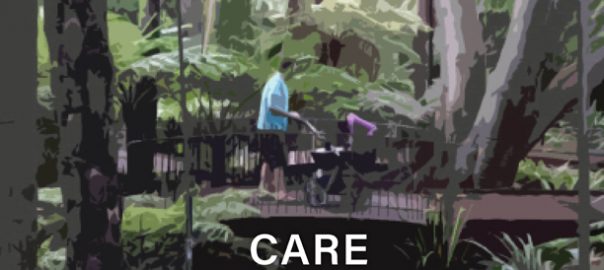

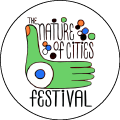

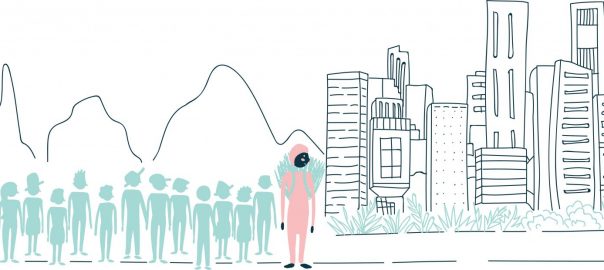
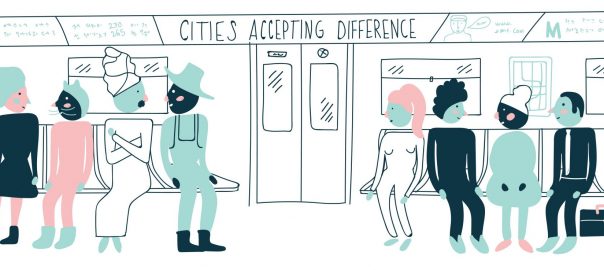


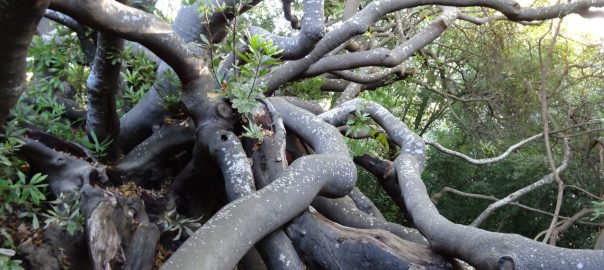
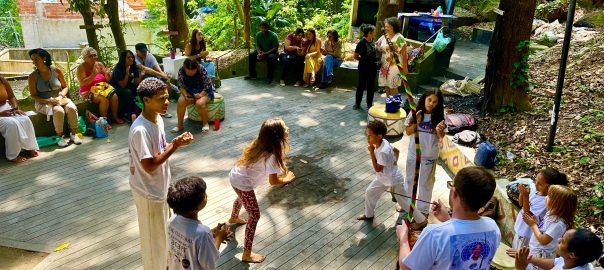
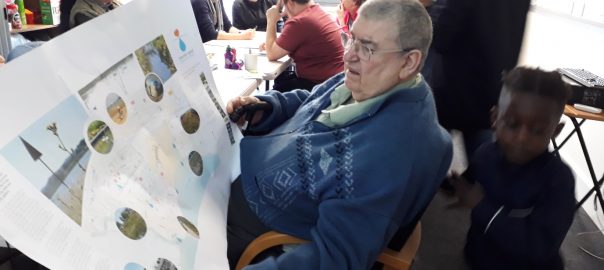
Add a Comment
Join our conversation